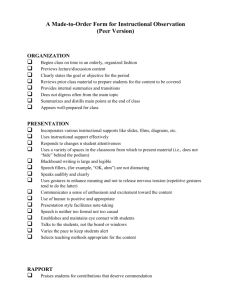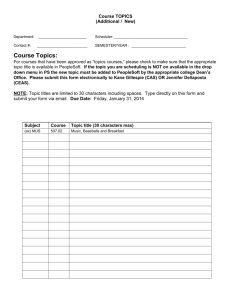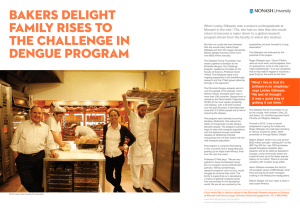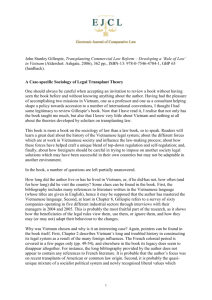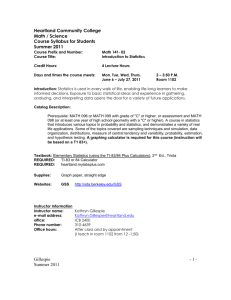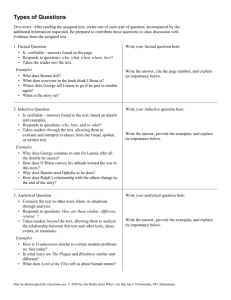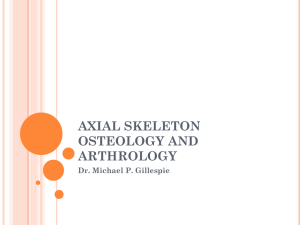Course title: International Media and Marketing (國際媒體與行銷
advertisement
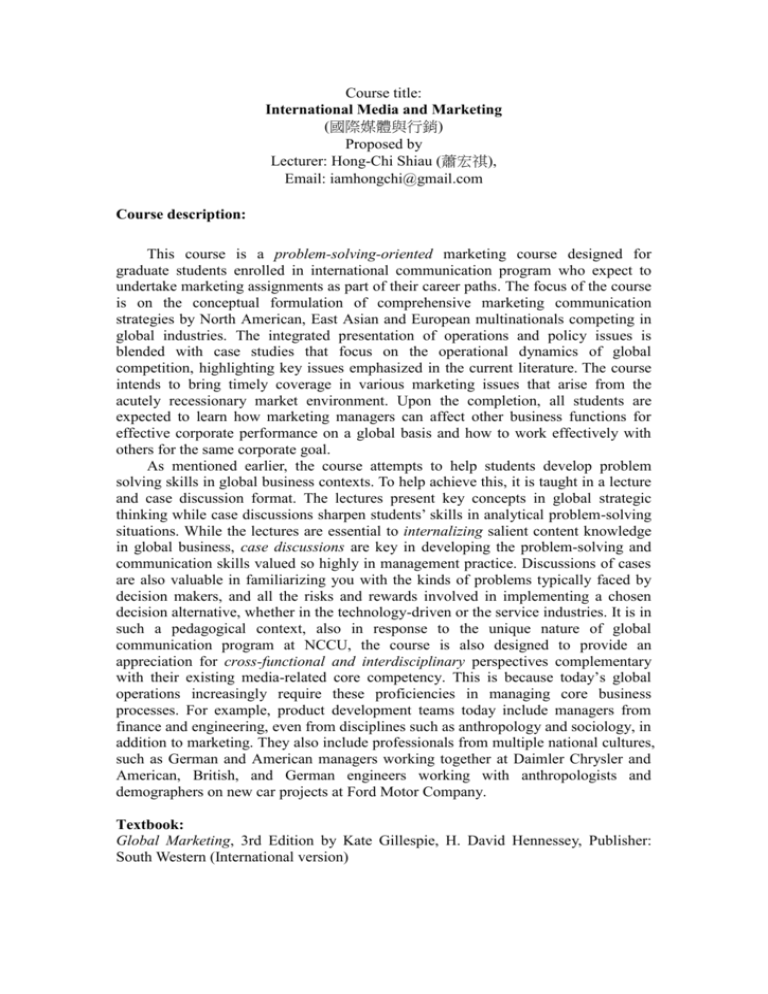
Course title: International Media and Marketing (國際媒體與行銷) Proposed by Lecturer: Hong-Chi Shiau (蕭宏祺), Email: iamhongchi@gmail.com Course description: This course is a problem-solving-oriented marketing course designed for graduate students enrolled in international communication program who expect to undertake marketing assignments as part of their career paths. The focus of the course is on the conceptual formulation of comprehensive marketing communication strategies by North American, East Asian and European multinationals competing in global industries. The integrated presentation of operations and policy issues is blended with case studies that focus on the operational dynamics of global competition, highlighting key issues emphasized in the current literature. The course intends to bring timely coverage in various marketing issues that arise from the acutely recessionary market environment. Upon the completion, all students are expected to learn how marketing managers can affect other business functions for effective corporate performance on a global basis and how to work effectively with others for the same corporate goal. As mentioned earlier, the course attempts to help students develop problem solving skills in global business contexts. To help achieve this, it is taught in a lecture and case discussion format. The lectures present key concepts in global strategic thinking while case discussions sharpen students’ skills in analytical problem-solving situations. While the lectures are essential to internalizing salient content knowledge in global business, case discussions are key in developing the problem-solving and communication skills valued so highly in management practice. Discussions of cases are also valuable in familiarizing you with the kinds of problems typically faced by decision makers, and all the risks and rewards involved in implementing a chosen decision alternative, whether in the technology-driven or the service industries. It is in such a pedagogical context, also in response to the unique nature of global communication program at NCCU, the course is also designed to provide an appreciation for cross-functional and interdisciplinary perspectives complementary with their existing media-related core competency. This is because today’s global operations increasingly require these proficiencies in managing core business processes. For example, product development teams today include managers from finance and engineering, even from disciplines such as anthropology and sociology, in addition to marketing. They also include professionals from multiple national cultures, such as German and American managers working together at Daimler Chrysler and American, British, and German engineers working with anthropologists and demographers on new car projects at Ford Motor Company. Textbook: Global Marketing, 3rd Edition by Kate Gillespie, H. David Hennessey, Publisher: South Western (International version) Case studies from a wide range of sources will be prepared for discussion. Based on the number of students in the class, case studies will be selected to each student for leading the group discussion. Grading scheme Country briefings 10% -- a case study warm up exercise: Select five indicators from database and a news article from Variety, Advertising Age, Wall Street Journal (Media and Consumption section), Economist to brief a country story revolving around media product flows, brand strategies, advertising/integrated marketing communication In-class case briefings 30%, come prepared, you will be paired to work on a case assignment in a prescribed manner (Requirement will be passed on) Attendance and Participation 20%, Final paper: 40%, a case study shedding light on a specific academic question or debate (globalization, branding, standardization, government control…etc.) Schedule A. Conceptual Foundations: Forces That Shape the Global Knowledge Economy and Implications for Global Marketing Management Week 1/ 916 Week 2/ 923 Introduction, Case Approach; how to do a case study Introduction to global marketing, Global economy (Gillespie chapter 1, 2) Week 3/ 930 Cultural and social forces (Gillespie chapter 3) Country briefing 1: 1,2,3,4,5 Week 4/1007 Country briefing 2; 6-20 Week 5/1014 Political and regulatory climate (Gillespie chapter 4) B. Understanding global market, identifying opportunities, formulating strategies for market entry Week 6/1021 Global markets (Gillespie chapter 5) Case 1 iphone in South Korea (Team 1 presents, 10 responds) Week 7/1028 Global competitors (Gillespie chapter 6) Case 2 Honda in Europe (Team 2 presents, 9 responds) Week 8/1104 Global participation and market entry (Gillespie chapter 8,9), proposal discussion Week 9/1111 Case study final paper’s proposal presentation Week 10/1118 Case 3 The Simpsons, (Team 3 presents, 8 responds) Case 4 Carrefour Entry into India, (Team 4 presents, 7 responds) responds) Case 5 Singapore: A Melting Pot ( Team 5 presents, Team 6 responds) C. Formulating a Global Strategy: Developing Markets The internationalization process, designing global strategy and value added chains, global product/market portfolios, marketing in developed vs. developing countries, estimating foreign market potential, modes of foreign entry, exporting, contractual, and investment involvement modes. Week 11/1125 Global market entry (Gillespie chapter 9) Case 6 Guest-tek Interactive Entertainment: International Sales (Team 6 presents, Team 5 responds) Week 12/1202 Global product strategies (Gillespie chapter 10) Case 7 AGT, Inc. (Team 7 presents; Team 3 responds) Week 13/1209 Global strategies for services, brands, and social marketing (Gillespie chapter 11) Case 8 Shanghai Tang: The first global Chinese luxury brand? (Team 8 presents; Team 2 responds) Week 14/1206 Global promotion strategies(Gillespie chapter 14) Case 9, IKEA: furniture retailer to the world (Team 9 presents; Team 2 responds) Week 15/1223 Managing global advertising (Gillespie chapter 15) Advertising and media, In Global marketing and advertising: understanding cultural paradoxes. Marieke de Mooij (2005) p135-162. Case 10: Yuhan-Kimberly: “Keep Korea green”(Team 10 presents; Team 1 responds) Week 16/1230 Final paper presentation 1 (1-10) Week 17/0106 Final paper presentation 2 (Final exam week) (11-20) Week 18 No class (election) Given that you may not know each other, I have helped assign group for you. Your number is on the enrollment list. Group team assignment Team 1: 1, 20; Team 2: 2, 19; Team 3: 3, 18; Team 4: 4, 17; Team 5: 5, 16; Team 6: 6, 15; Team 7: 7, 14; Team 8: 8, 13; Team 9: 9, 12 Team 10: 10, 11

